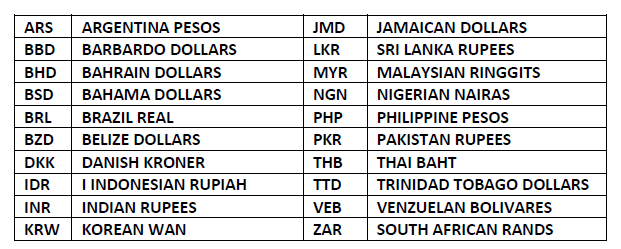Foreign currency fluctuations are of significant concern when managing either:
- Awards written in foreign currency, or
- Awards where work is conducted or expenses are incurred in other countries and payment must be made in the foreign currency.
Impact of Exchange Rate Fluctuation
Exchange rates tell you how much your currency is worth in a foreign currency. The exchange rate is the price of one currency expressed in terms of another currency. For example, the average exchange rate of the U.S. Dollar to the Euro for 2018 was 0.85. This means 1 U.S. Dollar was equivalent to 0.85 Euros.
Currency exchange rates vary over a project lifecycle, from the proposal to when the funds are transferred, drawn and spent, and when the financial reports are prepared and submitted. As a result of these fluctuations, your project may end up with less (or more) foreign currency than originally anticipated.
For example: UCD receives an award for €100,000 on July 1, 20XX. On that date the exchange rate is $1.15/€1.00 so the award is worth $115,000 at that point in time. However, exchange rates fluctuate all the time so if they fall to $1.05/€1.00 when the sponsor actually makes payment, UCD would only receive $105,000. Should this happen, the PI/department is responsible for the $10,000 shortfall. Should the exchange rate go the other way, the PI/department would get the benefit of the additional funds recovered.
Exchange rates can be obtained from a variety of sources such as XE Live Exchange Rates and Currency Converter and OANDA Currency Converter
Awards Established in Foreign Currency
All UCD departments should be aware of the risks, including potential loss of Dollars, involved in agreements containing payment terms in foreign currency.
To reduce the risk associated with exchange rates, award amounts and payment terms should be established in U.S. dollars. If the sponsor will not agree, exchange rate risk can be reduced by incorporating one of the following into the agreement:
1. Payment in full upon execution of the agreement
2. As much advance payment as can be mutually agreed upon
When a sponsor will not agree to establish an award and payment in U.S. dollars or pay in advance, each time there is a cash payment CGA will adjust the award budget, both direct and indirect proportionally, to reflect the current exchange rate. Since this creates risk of shortfalls in the awarded amount due to fluctuations in the exchange rate, the PI should stay abreast of the impact on the budget throughout the life of the sponsored project. If cost overages occur, the department will be responsible for clearing the overdraft to a discretionary fund source.
NOTE: Bank of America does not support checks in the following currencies due to Exchange Control Regulations. Payments coming from these countries must be made by wire. List is current as of June 2019.

Awards with Foreign Currency Activity
Awards written in U.S. dollars for projects with significant foreign activity also have risk which must be managed. PIs should be aware of these risks:
1. Purchasing goods and services abroad
Comply with institutional purchasing policies and procedures, U.S. government restrictions (such as economic embargoes and export controls), and any fund restrictions (e.g., donor imposed). Only authorized individuals may enter into contracts and approve purchases on behalf of the institution.
When making purchases abroad, consider:
- How the goods or materials will be transported either to the U.S. or between foreign sites
- Methods of payment
- Currency conversion
- Transacting in a foreign language
- Export controls
Transactions on behalf of the institution: Comply with UC policies regarding dollar thresholds, contract length, etc. Only authorized individuals may enter into transactions on behalf of the institution and high-dollar purchases and/or long-term contracts need to be approved by UC legal counsel and procurement office, and may have to be signed by host-country authorities in addition to UC.
- Best practices call for a code of ethics regarding purchasing, and require that those involved in purchasing and approving sign the document and retain copies in home and host country.
- Ensure that host-country program director or designee and others involved in the procurement process are properly trained to enter into contracts and subcontracts.
- Define in writing what constitutes a vendor and what constitutes a subcontractor, including the differences between the two.
- Comply with fund terms when entering into contracts if paying with sponsored funds.
2. Monitoring budgets
Foreign Currency Fluctuations – The budgeted cost associated with a foreign component of an award may be significantly impacted by exchange rate fluctuations. For example, if a project employs staff in a foreign country the costs will fluctuate continually and perhaps significantly.
UCGO - Program budgets are in U.S. dollars, but many transactions occur in local currency. Review exchange rates often so that you are aware of and can prepare for the impact of significant fluctuations and consider revising your budget closer to award stage or implementation. If you're receiving a donation or funding from a non-U.S. source, clarify whether the amount will be calculated in U.S. or foreign currency.
3. Financial Reports
Exchange rate fluctuations add a layer of complication when reporting project expenses incurred in foreign currencies. It is necessary to accurately translate the foreign expense to dollars in order to post accurate expenses to our ledgers.
4. Audit risk
Conversion of U.S. dollars to the foreign currency must be fully documented and the records retained to support audit inquiries. The documentation of record should be maintained with the department, not only at the foreign location. Departments must retain full supporting documentation in accordance with the UC document retention schedule.
UC Global Operations also provides very useful information regarding international project management.